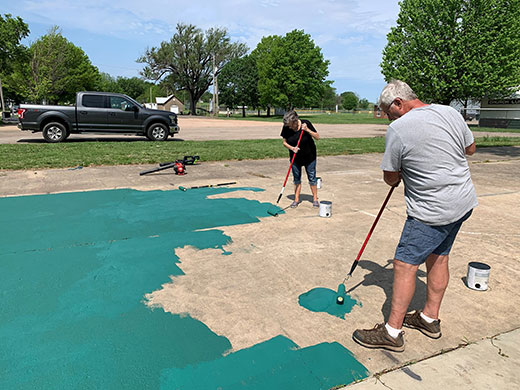Johannes encourages people to look for ways to be civically engaged
Most folks generally accept that maintaining good health includes an annual visit to the doctor to check their heart, teeth, ears and more.
But, says Elaine Johannes, there’s more to personal health than some may realize.
“The Robert Wood Johnson Foundation has done quite a bit of research over the years that affirms that a little over 50% of our overall health is related to the places that we live, learn, work, play and pray,” said Johannes, the Kansas Health Foundation’s Distinguished Professor of Community Health at Kansas State University.
Johannes said research indicates that being engaged in one’s communities is connected to living longer. “So,” she says, “we should look for opportunities to be civically engaged, and be aware of opportunities to volunteer and be involved in clubs and organizations. That’s part of civic health.”
According to Johannes, civic health reflects the opportunities people have to participate in their communities, and can be summed up in three areas:
• Places—Healthy communities have places where people can get together formally or informally, such as festivals in a city park; or a library with extended hours.
• Processes—Healthy communities make it easier for citizens to have their voices heard. Some examples: Are voting processes easily understood? Do citizens know what it takes to run for public office? Can people participate in meetings in-person and online?
• People—In healthy communities, people get involved as volunteers and in other roles. People are socially engaged.
“When the social capital is in place—places, processes and people—the community is fairly strong,” Johannes said. “Then, the overall health of the people in the community goes up. And there’s research that supports that.”
The University of Wisconsin Population Health Institute annually publishes the County Health Rankings and Roadmaps for every county in the United States. Johannes said the report combines data and evidence to support community-led efforts to improve health equity and community power.
The yearly report includes links to information specific to Kansas counties, rating each according to such health outcomes as length of life and quality of life; and such health factors as adult smoking, obesity, physical activity and more.
Johannes said the 2023 report includes information about the civic health of states and counties. She said Kansas is among 16 states that have more structural barriers to civic health.
“Research shows that states with well-resourced civic infrastructure have more civic participation, which is tied to how well and how long we live,” she said.
Johannes, whose office is on the K-State campus in Manhattan, is part of the larger, statewide network of extension professionals whose job includes supporting health in every Kansas county.
“Many of our K-State faculty and our professionals across the state and in extension offices are part of the university’s community vitality work in Kansas,” she said. “Those people are being trained to provide facilitation and to convene people to talk about the important issues of the day.”
According to Johannes, many counties have community vitality staff or specialists who can train residents on how to serve on local committees and boards. More information is available online and from local extension offices in Kansas.
A longer discussion with Johannes regarding civic health is available on the weekly radio program, Sound Living, produced by K-State Research and Extension.




